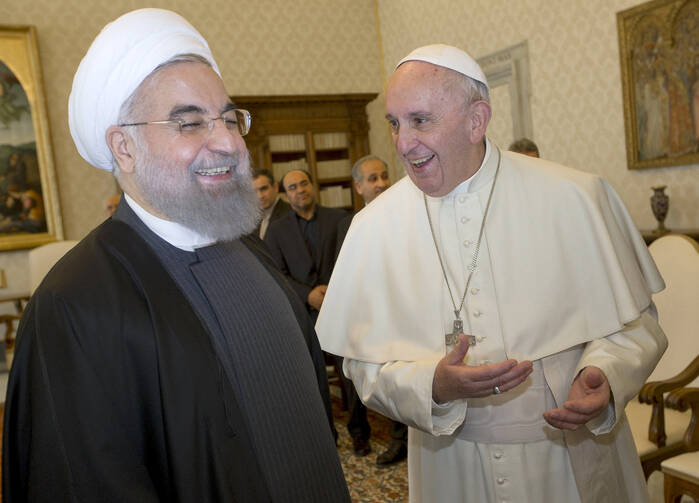“I thank you for this visit and I hope for peace,” Pope Francis told Iran’s President Hassan Rouhani as he bade him farewell at the end of their meeting in the Vatican, during which they discussed the recent nuclear accord, Iran’s role in the quest for peace in the Middle East, and the contribution religious communities can make to reconciliation and peace.
“I ask you to pray for me,” the Iranian leader responded as he departed, adding that his visit was “a real pleasure.”
Those parting words, captured by the journalists present at the end of the meeting, as well as the relaxed body language and broad smiles of both men suggest their conversation had gone very well, and that they had connected with each other.
While the substance of their 40 minute private conversation behind closed doors, with the assistance of two translators—an Iranian woman and a Salesian priest—remains confidential, the Vatican afterwards issued a press communique which revealed some of the topics discussed in both the president’s encounter with the pope, and his subsequent talks with the Secretary of State, Cardinal Pietro Parolin, and the Secretary for Relations with States, Archbishop Paul Gallagher.
The Vatican said that during “the cordial discussions” they had spoken about “common spiritual values” and “the good state of relations between the Holy See and the Islamic Republic of Iran” as well as “the life of the Catholic Church in the country” and “the action of the Holy See to favor the promotion of the dignity of the human person and religious freedom.”
It said they also discussed “the conclusion and application of the Nuclear Accord” and highlighted “the important role that Iran is called upon to fulfill, along with other countries in the Region, to promote suitable political solutions to the problems afflicting the Middle East, to counter the spread of terrorism and arms trafficking."
Moreover, it reported that both sides had highlighted “the importance of interreligious dialogue and the responsibility of religious communities in promoting reconciliation, tolerance and peace.”
Iran has a population of over 77 million people, 98 percent of whom are Muslims (some 90 percent belong to the Shi’a branch of Islam and a minority to its Sunni or Sufi branches). There are some 350,000 Christians in the country (including 5,000 Catholics) and, like the Jewish and Zoroastrian communities, they enjoy freedom of worship.
Pope Francis and the Holy See welcomed today’s visit. It was the first by an Iranian President since 1999, when President Muhammed Khatami visited John Paul II. In the intervening years, however, there have been high-level diplomatic and inter-religious exchanges between the two sides and relations have remained friendly and solid. The Holy See, moreover, carefully avoided siding with the Western powers against Iran when their relations with the Islamic Republic were turbulent and reached a low point. The Holy See and Iran have had formal diplomatic relations since 1954.
The encounter that took place today had been scheduled for earlier this year, but had to be cancelled at the last moment because of the terrorist attacks in Paris, Nov. 13.
President Rouhani’s visit to the pope came as part of his four-day visit in Europe that was aimed not only at boosting his country’s image, building on the signing of an international agreement on Iran's nuclear program in July 2015, but also at re-establishing economic ties that had been disrupted by the sanctions against the country in recent years.
At the end of their private meeting, the Iranian President presented his 12 member delegation to the Pope, who greeted each one. It included the country’s Foreign Minister, Mohammad Javad Zarif, and its Ambassador to the Holy See, Mohammad Taher Rabbani. Then the two leaders exchanged gifts. President Rouhani gave Francis a gift of a hand-made carpet, made in the Holy City of Qhom, while the pope gave him a medallion depicting St Martin giving his cloak to a poor man, and a copy of his encyclical, "Laudato Si’."








